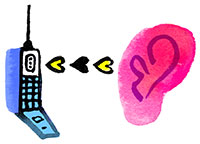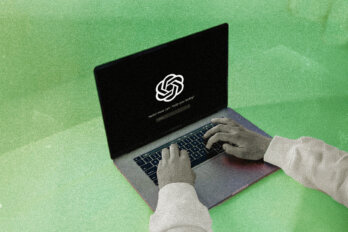
Our dinner guests should arrive any minute. I push a wet comb through my hair and put on a jazzy shirt: black with pearly snaps, a couple of embroidered roses below the collar. If I’m going to resemble a demographic group, it might as well be urban cowpoke. My Rush concert tee, now crumpled in the corner, would suggest prog rock dork, which, while closer to the truth, might be harder on my self-esteem. The bell rings, and on my way to the door I glance into the kitchen. My girlfriend is listening to CBC while leafing through the Globe. She’s going for young professional. Nice pose, I think; that newspaper is almost a week old.
As a pallid man and woman squeeze past me into the apartment, I notice that both are a bucket of chicken overweight. If this seems like a cruel observation, it’s also germane: these people, whom we’ve never met, are here to watch us eat frozen pizza. They work for a market research firm that was hired by a multinational food company to study consumer habits. For acting natural, we’ll be paid $175.
First, while the oven heats up, the man wants to verify some personal information my girlfriend has given the recruiter. (She had responded to a classified ad and got us on the call list.) As I recall, when the recruiter heard I was a writer she said, “I’ll put him down as ‘currently unemployed.’” She wasn’t wisecracking either: any kind of media affiliation was a disqualifier. Most pertinent was whether or not we ate three to five pizzas per month. My girlfriend said I probably ate that many myself.
“So you aren’t married? ” the man now asks, sitting at strict attention on one of our mismatched kitchen chairs.
“Common law,” I say, wondering if that means we’ll somehow get paid less.
Our two-bedroom apartment is long and narrow, the cramped kitchen at one end. The woman struggles to position a video camera in the hallway such that it captures the entire room, and eventually she nods to her partner. He grins at us so briefly it’s like a tic. “I have a few more questions,” he says, “and then it would be best if you’d pretend we’re not here.”
He either takes his job very seriously, I think, or he’s an android. “What would you say is unique about these nights? ” he asks as I collect the pizza from the freezer.
“It’s often a Sunday,” I say.
“Is it? ” my girlfriend says.
I slide the pizza from its garish box. “Isn’t it? You know, lazy Sunday. Don’t-feel-like-cooking Sunday.” With scissors, I cut away the vacuum-sealed plastic sleeve. “Sometimes it’s a Wednesday,” I say. “Don’t-feel-like-cooking Wednesday.”
“I guess so,” my girlfriend says. “I’ve never thought about it.” I’m suddenly worried she won’t play along. She’s going to talk about wasteful packaging and the suspect nature of preservatives. She’s going to tell them she likes to cook, that she finds slicing vegetables a meditative process, and that having three or four dishes ready in unison is just something certain people have a knack for. She’s going to be honest.
Our interrogator levels his gaze at her. “What is the meaning of a night like this? ”
My girlfriend scratches her head. “It is a simple meal,” she ventures. “Maybe we have more time to spend together when one of us isn’t busy at the stove.”
Phew. She’s just improvising. Over the next twenty minutes, as the tiny kitchen heats up, the man remains intent on her. I must be the easy mark, a bachelor in every way except relationship status. They’ll always be able to sell their cheap pies to guys like me. It’s the women they want.
“Do you ever eat them on your own? ” he asks her.
“It’s been known to happen,” she says. (She sounds sad when she lies.)
With a spatula, I transfer our dinner to the cutting board, and we all watch the cheese roof quiver and steam. That’s one way frozen can’t compete with delivery: as long as the delivery man knows the shortcut to your cul-de-sac, that large meat lover’s is the perfect temperature the first time you lay eyes on it. You can eat most of a slice on your way back to the sofa. “There’s nothing worse than burning your mouth,” I say. “You get that soreness, and the tissue dangling down.” I ask the man if he knows that feeling.
“It interests me to know that you know that feeling.”
The sudden glitter in his eye suggests a data crystal; perhaps he sees my face framed by a scrolling inventory: shoe size, current liquid assets, preferred dental floss…
He invites us to begin eating. With the Q&A done, we can start to relax and behave more like ourselves. My girlfriend has returned to her newspaper, so I reach to the stovetop for the empty pizza box. The ingredients make me dizzy—I mean reading them. I wonder if it’s the oleoresin paprika that makes the pepperoni so, um, reliable. But I don’t want to say anything that will end up on the side of a bus or framed above a pub urinal, and even sarcasm doesn’t feel safe. It’s not my soul that would feel robbed; rather, if I happened to come up with a few bons mots, I know I’d never receive fair compensation. I eat fast and keep my mouth full.
The cash comes in a blank, unsealed envelope: three fifties, a twenty, and a five.
Do I feel greasy? Very. A little ultra-gentle liquid hand soap should do the trick.
Answering Machine
Meet the woman at the other end of the line
Until her death in 2003, Jane Barbe was the most ubiquitous voice actress in North America. If you have ever been told, “I’m sorry, the number you have reached is not in service,” chances are you’re familiar with her work. After studying drama at the University of Georgia, she got her break in 1963, doing time and weather updates for the Audichron talking clock company. Soon she was taping intercept messages for major phone companies, lending her voice to the most mundane of mechanized processes. Barbe treated her job as an art form. She adjusted her tone to reflect regional speech patterns—crisp delivery for the northeastern United States, soft and pleasant for the South—and devoted hours of studio time to every ten-second recording. In a radio interview with Dennis Daily, she explained her philosophy: “When I record, whether it be time and temperature or a weather message or a telephone intercept message, I think, ‘one on one.’ The whole idea of the service is to try and make it personable and friendly and conversational, so that people don’t feel as if they’re talking to a machine.”
—Amirah El-Safty
This appeared in the December 2011 issue.



